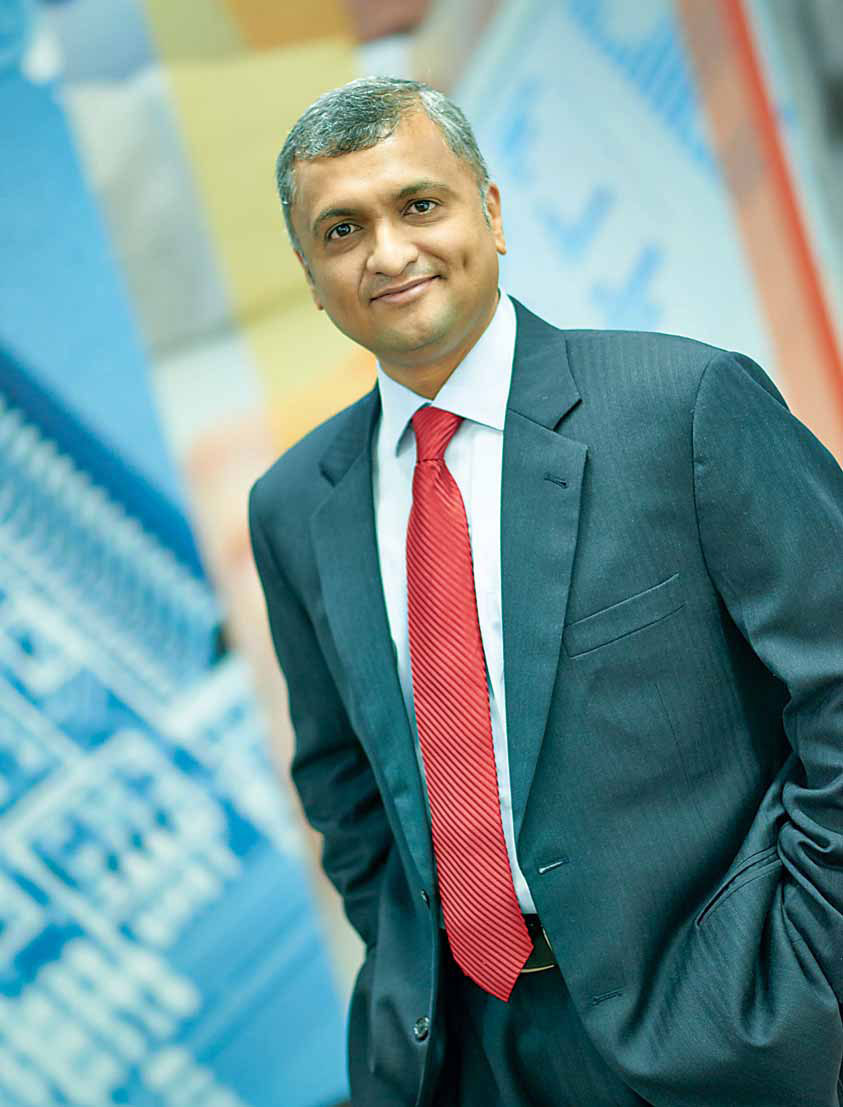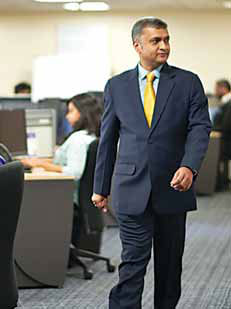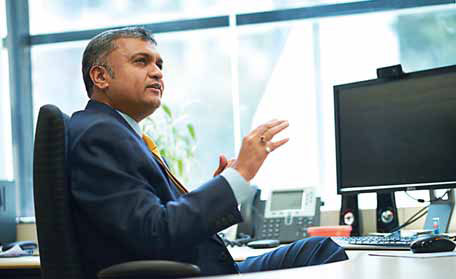
BNY Mellon is the largest custodian in the world. Between them, they administer $23 trillion worth of assets. It is speculated that the total amount of money in the world is $100 trillion, and BNY Mellon administers 1/4th of it. Which is why when BNY Mellon India CEO Dinesh Deo shared his words of wisdom with aspiring students at a conclave, Corporate Citizen was on the spot to have a tete-a-tete with the man himself. Here’s what he has to say upon his career, the legacy of BNY Mellon, and what it takes to succeed in corporate life
I am a proud Puneite. I was born and brought up in the city. I even completed my graduation from SP college here. My articleship was with S B Billimoria, which is now Deloitte. Then I did my CA, after which I joined Thermax as a management trainee. Post that I joined GE. I served several roles within GE. Around that time the off-shoring industry was growing. That is where I honed my leadership skills and learnt the business side of things. In 2005, I came to Bank of New York. I am now in my 12th year there and oversee the operations for entire India, which has around 6,000 employees in Pune and Chennai.
Bank of New York was 223 years’ old when it merged with Mellon. Mellon was also 180 years, old. Both the founders of BNY and Mellon were treasury secretaries to their respective US Presidents. Alexander Hamilton, who was the right hand man to George Washington founded BNY, and made it the first company to be listed on the New York Stock Exchange. BNY Mellon is one of the oldest banking institutions in the world and also one of the most respected.
All of us know about the Lehman Brothers crisis, which nearly took down the banking industry in 2008. Think about how many such crises BNY Mellon must have seen in its time. It is still thriving. Companies must be able to change with time, to evolve while keeping the foundation strong. The principles have to be very strong, but the leadership styles must evolve to suit the business needs. Earlier, we competed with only banks. Today, the changing economic scenario is such that a company like Uber, can come out of nowhere and become a huge powerhouse. In such a scenario, a 200-year legacy doesn’t help. Innovation has to keep up with the times. And that is what BNY Mellon is good at.

I think my strength is people. I believe any organisation is successful for two reasons. One is its people and the other is its culture. Whatever the economic scenario, if the organisation gets the people and culture right, where it hires the right people and inculcates a transparent, open and inclusive culture, there the people and the organisation can conquer the moon. I believe attitude is more important than aptitude. A leader’s role is nothing but to provide that foundation to its people. That is my philosophy.
I’ll tell you what I don’t do. Money is not the biggest motivator. There are organisations that believe in using money as a motivator to retain people. I firmly believe that money can’t motivate you for more than 24 hours. To motivate people, you need to pay them adequately of course, but you need to intellectually challenge them, you have to give them scope for professional and personal growth. Only then can they stay motivated.
Technology is evolving so rapidly, that there is no time for reaction. The pace of change is faster than the time of reaction. Students will have to constantly self-improve. They will have to keep updating their knowledge. The human brain is far more advanced than computers, and if humans update their knowledge, they will thrive. Students and teachers should prepare for tomorrow and not for today.
In my view, one of the factors for a shortage of youth joining this industry could be the conservative image this industry holds. The education sector can surely change that perception by conveying the needs of the industry as well as the career or prospects this industry has to offer.
With a focused approach in the curriculum, we could surely help develop talent for this sector. There is significant opportunity for partnership between global financial organisations like ours and the education sector which would be mutually beneficial.
“Whatever the economic scenario, if the organisation gets the people and culture right, where it hires the right people and inculcates a transparent, open and inclusive culture, there the people can conquer the moon. I believe attitude is more important than aptitude. A leader’s role is to provide that foundation to its people”
BNY Mellon India is today is spread across two cities, Pune and Chennai, with a combined staff strength of over 6,000 employees. India has always been a key strategic location to BNY Mellon. With our presence in India of over 11 years, we continue to grow and expand our footprint in India.
“Your academic success does not make a big difference to your corporate career. Everyone starts with a clean slate, and corporate life is very different from academic life. People who do not do so well in academics have managed to go on and have stellar corporate careers. I am a CA by education, but I do not touch books of accounts at my job. I am a people person, but for that I did not receive any professional training. What you are trained for and what you are good for may not be the same thing. The trick is to identify what you are good at, and apply your skills to the betterment of that quality. That one expertise of yours can be the foundation of your career. Identify that one area which you are good at, hone it, and watch your career soar”

CSR or rather Community Partnership, as we call it at BNY Mellon, thrives purely on our belief of contributing by way of volunteer work.
Today we are working with various NGOs on three key focus areas, health, education and community/village development. One of my favourite is the RO water filtration plant that we installed in Siddhegavhan village, which today services the villages in and around with pure drinking water. This year we aim to build toilets in Siddhegavhan (Pune) and Melanur village (Chennai). In 2015, we also partnered with SOFOSH to provide with surgical and life-saving medical equipment to Sassoon Hospital.
As a policy, at BNY Mellon, we encourage volunteering, where employees get a choice to volunteer for their preferred community partner, to which we then offer a matching grant based on the number of hours contributed. In addition, we offer our employees time off work to enable them to contribute to such initiatives.
In 2015 itself we contributed over 16,282 hrs with 3,580 volunteer across 208 events. What makes me proud is fact that the hours contributed by the employees were either before or after their work hours or on the weekends. It just goes to show the commitment and passion our employees share towards our community.
“Technology is evolving so rapidly, that there is no time for reaction. The pace of change is faster than the time of reaction. Students will have to constantly self-improve. They will have to keep updating their knowledge on a regular basis”
My entire family is in Pune, where I work. In that sense I am very lucky. My wife works in Capgemini. My daughter is in the third standard. My mother also stays with us. I think you need to choose your priorities. When I’m at work, I’m at work. When I’m home, I don’t touch my emails or iPad. I am a firm believer of not taking your work home with you. When I’m in the car, I may check twitter or mails, but not when I am at home. I feel that if the issue requires my immediate attention, they will call me directly. If you are able to compartmentalise and focus on the task at hand, multi-tasking isn’t difficult.
On Facebook I have 3,000 friends, and 2,999 of them are from my office. I only use Facebook for official purposes. I don’t use it for any personal updates, and it’s a conscious choice I have made.
I love to travel. I have visited 23 countries, and will soon be visiting my 24th. I have travelled around the world, and really love it. I travelled to Andaman last month and I’m still spellbound by the beauty. I believe in taking a break every few months and going on vacation, recharging your batteries and then come back and work. I wasn’t a big health person but now I have begun to focus on my health and visit the gym regularly. I believe running is very relaxing, especially in the morning.
I love this movie called Zindagi Na Milegi Dobara. You only live once. Make the best of the time you have on this Earth. What’s the point in adding stress to your life?
By Neeraj Varty